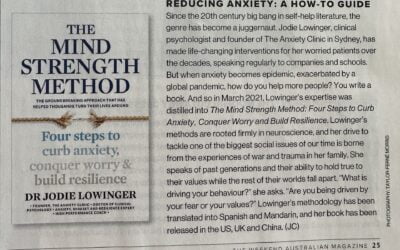5 tips for teachers on how to boost your wellbeing

Educators have a lot of responsibility, regardless of the age of their students. From coaching them in literacy, numeracy and sport, to physically protecting them from harm, teachers have to be vigilant and switched on at all times. As a result, it’s crucial that teachers maintain their personal wellbeing, so they can continue giving their all in the workplace.
These five tips for boosting teacher wellbeing are part of our Mind Strength framework, designed to build resilience, foster a growth mindset, smash fear and anxiety, and drive peak performance.
1. Mind-body connection
A healthy mind needs a healthy body. The two cannot exist without each other. Sleep, eating, exercising and drinking water are essential for a healthy body and mind. Getting the right amount of sleep and sticking to a sleep routine sets us on the right track to wellbeing. When we eat a balanced diet, drink lots of water and get moving, our mind functions at a higher level and it improves our mood. We often think about working out our body but we need to think about working out our mind. Whether your mind workout means stopping to take three long, slow out breaths or meditating for 20 minutes a day, we need to find the right mind exercise to balance the mind-body connection.
For teachers with busy schedules, an option could be to exercise on the way to work, rather than before or after. Get off the train a stop early and walk the rest of the way to work, or tune into a mindfulness podcast on the bus. Everyone has a different preference, but with the amount of apps, websites, and programs available at your fingertips, you are guaranteed to find an approach that works for you and your lifestyle.
2. Interpersonal connections
We are tribal beings and have a need for real human connection to recharge and thrive. This is just how we are wired. The challenge is that when we’re stressed or experiencing a low mood, we tend to withdraw or lash out. This is the opposite of what we really need to grow and perform at our best. Taking time to connect with friends, family and colleagues is not a “nice to have”, it’s a human necessity. Engage with the people who energise you, particularly when we’re feeling like we want to hide away, as these connections are what fuels us.
At least once a week, take the night off marking student essays, and catch up with your friends for dinner or spend time with your family. Making a conscious effort to continue to engage with people beyond the workplace will increase the quality of your work and your life.
3. Listen to your mind and body
We all have a voice in our head that speaks to us. It’s what we call our “critical voice” or “worry voice”. In order to lessen the intensity of that voice, we need to acknowledge it and change our relationship with those thoughts. Once we recognise those thoughts as worry thoughts and critical thoughts, we reduce their power and instead, see them as just thoughts that we don’t need to be driven by.
In times of stress and anxiety, worry tells us to avoid situations that make us feel uncomfortable. Rather than give worry the attention it’s seeking, we need to listen to our heart and what truly gives us meaning and gradually approach the situations we tend to avoid. It is through this gradual approach that we can build the resilience we need.
There’s no doubt that being a teacher can be a taxing job. It can be easy to take negativity to heart, so learning to reassign thoughts is a crucial skill to maintaining your mental wellbeing.
4. Switch off
Social media and technology can be great for keeping us connected to people that we don’t always get to see in person. However, the negative side of always having a smart device at hand is that it can cause us to be on edge. We wait for messages, likes and follows, and can lose time with endless scrolling. Disconnecting from social media and our screens, means that we can connect better with the people and environment around us.
An easy way to manage our social media usage is to put a time limit on it. Allocate yourself half an hour to use social media when you get home, and be sure to switch off at least an hour before you go to bed, to ensure you get a good night’s sleep.
5. Purpose
Meaning and purpose is what energises us. Simply going about our daily routine is not enough for long-term wellbeing. When we are feeling and performing at our best, it is connected to something bigger than us. We need to think about what is the driving force behind what we do everyday. A strong sense of purpose that is connected to our professional and personal lives is essential for our wellbeing.
Ask yourself, what was that driving force that made you become a teacher in the first place? It’s easy to forget this when times are tough, so write it down to remind yourself of what sparks your motivation. Ensure that at every turn in your career you are teaching for the right reason – this will help maintain your wellbeing and in turn, your students’.
Contact us if you want to find out how Mind Strength can help your school.





